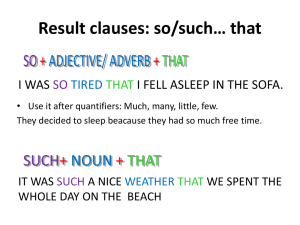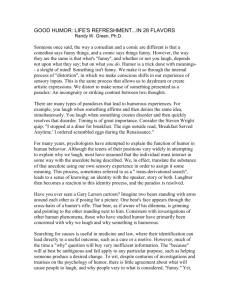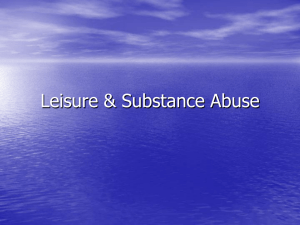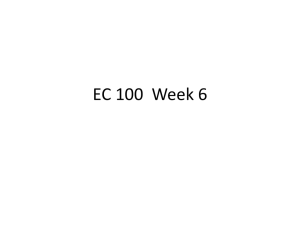Unit 1 Leisure Activities
advertisement
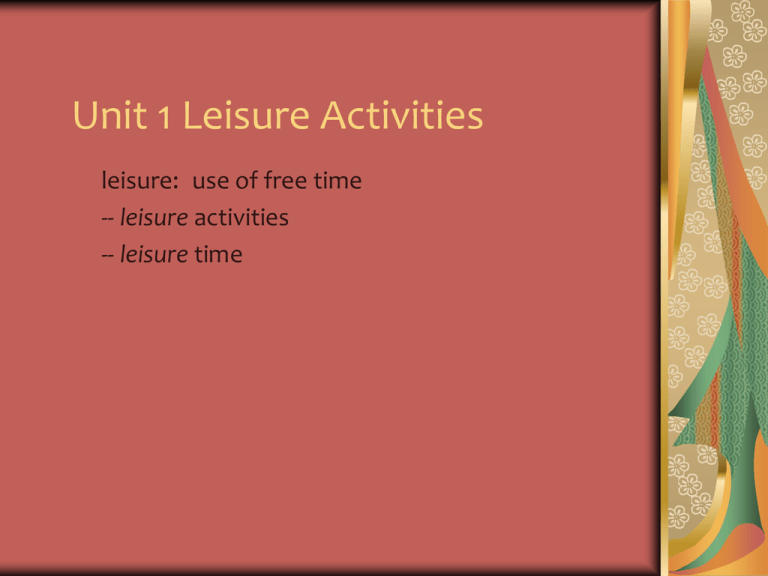
Unit 1 Leisure Activities leisure: use of free time -- leisure activities -- leisure time Part One: Preparation 1. pictures of leisure activities 2. Categories of leisure activities 3. Chat: How do you usually kill time (What are your favorite pastimes)? 4. Laughter and quick wits 1. pictures of leisure activities Bowling Golf shooting Airsoft / WG tourism river cruise crossword library / reading 2. Categories of leisure activities Outdoor activities: Tourism (traveling) Sports activities: playing tennis, playing table tennis, playing football, playing basketball, going swimming, going skating… bowling, golf… “Thrill seeking” kinds: mountaineering, skiing, white water rafting, bungee, parachute jump, shopping Indoor actitivities: reading, listening to music, watching VCDs, watching a sports match, Playing Video games, playing musical instruments, playing cards… Active activities: sports activities, dancing, going to Karaoke bars, … Passive activities: going to a concert, going to movies, going to theaters, going to the bars (pubs), … Recent ones are not much included… 3. Chat: How do you usually kill time? (What are your favorite pastimes?) Step 1: chat in small groups / talk to yourself Step 2: point out how your pastimes (leisure activities) affect your life 4. Laughter and quick wits Learn the words and expressions in E2 (P2) some types of humors that you are familiar with Cross-talk A play on words Pun; double entendre Clown Stand-up comedies --what makes people laugh in a certain type of humors? (cross-talk to many old people, a play on words, double entendre). (optional) watch the following comedies of several comedians with their own styles. Spoof: State of the Nation Address; whatever you like stand-up comedies: Nazi healthcare Cellphone Gay vs. Black Joe Wong Try to answer the following two questions: 1. What makes those jokes funny? 2. Why did some of you laugh at the jokes and some didn’t? Part two: Reading-centered Activities In-Class Reading: Entertaining Humor—What’s Funny After-Class Reading: I: Fatal Attraction II: Wow, Would I Love to Do That In-class Reading Entertaining Humor—What’s Funny? I. watch the following comedies of several comedians with their own styles. Spoof: State of the Nation Address; whatever you like stand-up comedies: Nazi healthcare Cellphone Gay vs. Black Joe Wong Try to answer the following two questions: 1. What makes those jokes funny? 2. Why did some of you laugh at the jokes and some didn’t? II: Find out the answers to the following questions in the passage Q1: What makes a story funny? --para. 1, 2, 5 Q2: Why do some people laugh at a joke while others don’t? --para. 3 Q3: List different types of humor, then define or illustrate them. --para. 6—12 Q4: Tell the difference between “A Play on Words” and “Puns”, and the difference between “Puns” and “Double Entendres” Q5: What are the usual criticism of today’s humor? And what is the author’s response to those blames? – Pra 13 If you want to tell people a truth, you’d better make them laugh, or they would hate you. --more remarks on humor on P15-E5 III. Language studies long / difficult sentences: grammar & writing A quick look at “New Words” & “phrases and expression” Exercises: Vocabulary After-Class Reading Passage I: A. Students’ presentation B. Further exploration Further exploration the pattern / characteristics of “whodunit” novels –para 2-7 differences between the real world and “whodunit” world –para 6,7 vs. para 8 differences between “whodunit” and “whydunit” novels –para 9 new words: assemble, aristocracy, loose end, (under) arrest, death penalty, convict, miscarriage of justice, unsettle, take on, exert E3-P26 Recommend: Lie to me Castle After-Class Reading Passage II: A. Students’ presentation B. Further exploration Further exploration Several phases: from an amateur to a professional (in juggling performance) What he scared of at first All the turning points New words start over, auditorium, elation, try out, get through E2: P35 Part III Further Development 1. Enrich your word power Part IV Translation 英译汉的长句翻译(1)-- 概述 practice Preparation for quiz 1. dictation: 10 new words 2. word formation: part of speech 3. prepositions & adverbs 4. translation: E—C, from ICR / ACR 5. Question answering: What is it that makes a joke or a story funny? (50-80 words)

